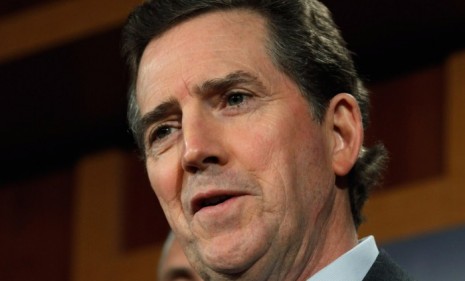Are the GOP's $2.5 trillion spending cuts realistic?
House Republicans have unveiled an ambitious 10-year proposal to slash government spending — without cutting entitlements or defense. Can they really do it?

A free daily email with the biggest news stories of the day – and the best features from TheWeek.com
You are now subscribed
Your newsletter sign-up was successful
A group of conservative House Republicans has unveiled a proposal to drastically slash federal spending over the next decade, with cuts aimed at almost all areas of government except entitlements and the military. The Republican Study Committee's plan would take funding away from public housing, arts, humanities, international aid, environmental and energy programs — cutting $100 billion this year, and $2.5 trillion in total by 2021. The American people are "ready for the tough-love solutions," said committee chairman Jim Jordan (R-Ohio) at the event's launch. "It doesn't fix everything but it's a good first step." Is it really? (Watch an MSNBC discussion about proposed spending cuts)
The GOP is making good on its promises: This plan is "a meaningful step in the right direction," says Samuel R. Staley at the National Review. Even if the cuts aren't that big — just $250 billion a year out of a budget that runs in the trillions — the proposals will "serve a valuable purpose" as a "menu of waste" from which we can choose what to eliminate. Such bold ideas show how "conservative fiscal principles" can help us clean up our budget mess.
"These spending-cut proposals are meaningful"
The Week
Escape your echo chamber. Get the facts behind the news, plus analysis from multiple perspectives.

Sign up for The Week's Free Newsletters
From our morning news briefing to a weekly Good News Newsletter, get the best of The Week delivered directly to your inbox.
From our morning news briefing to a weekly Good News Newsletter, get the best of The Week delivered directly to your inbox.
The plan, though well-intentioned, has some flaws: It's "troublesome" that the plan doesn't even "touch" entitlements or military spending, our two biggest expenses, says Doug Mataconis at Outside the Beltway. As long as they remain sacred cows, we can't find a true "solution to all our problems." Still, this plan is an overdue "first shot across the bow in the budget wars." Whether the GOP can get it passed is another question entirely.
"House Republicans propose $2.5 trillion in spending cuts over ten years"
These plans will cut American jobs, too: The chances of this passing are "non-existent," says Steve Benen in Washington Monthly. And that's a good thing, as the proposals would be "devastating for American jobs." Thousands of civilian workers in transportation and infrastructure would be fired, and states would be forced to make "sweeping job cuts." This plan doesn't just "ignore the problem," it would "deliberately make it worse."
"Republican Study Committee lays down a radical 'marker' on spending"
A free daily email with the biggest news stories of the day – and the best features from TheWeek.com
Republicans aren't being realistic: "Simple arithmetic" shows this plan wouldn't work, says Steve Bell, visiting scholar at the Bipartisan Policy Center, in Frum Forum. To save $100 billion this year, you would have to "really cut about 50 percent" of the budget for the rest of 2011 — that means "furloughs of hundreds of thousands of government workers," the closing of "most government-funded operations" and an end to all research grants. Try explaining that to voters.
-
 One great cookbook: Joshua McFadden’s ‘Six Seasons of Pasta’
One great cookbook: Joshua McFadden’s ‘Six Seasons of Pasta’the week recommends The pasta you know and love. But ever so much better.
-
 Scientists are worried about amoebas
Scientists are worried about amoebasUnder the radar Small and very mighty
-
 Buddhist monks’ US walk for peace
Buddhist monks’ US walk for peaceUnder the Radar Crowds have turned out on the roads from California to Washington and ‘millions are finding hope in their journey’
-
 The billionaires’ wealth tax: a catastrophe for California?
The billionaires’ wealth tax: a catastrophe for California?Talking Point Peter Thiel and Larry Page preparing to change state residency
-
 Bari Weiss’ ‘60 Minutes’ scandal is about more than one report
Bari Weiss’ ‘60 Minutes’ scandal is about more than one reportIN THE SPOTLIGHT By blocking an approved segment on a controversial prison holding US deportees in El Salvador, the editor-in-chief of CBS News has become the main story
-
 Has Zohran Mamdani shown the Democrats how to win again?
Has Zohran Mamdani shown the Democrats how to win again?Today’s Big Question New York City mayoral election touted as victory for left-wing populists but moderate centrist wins elsewhere present more complex path for Democratic Party
-
 Millions turn out for anti-Trump ‘No Kings’ rallies
Millions turn out for anti-Trump ‘No Kings’ ralliesSpeed Read An estimated 7 million people participated, 2 million more than at the first ‘No Kings’ protest in June
-
 Ghislaine Maxwell: angling for a Trump pardon
Ghislaine Maxwell: angling for a Trump pardonTalking Point Convicted sex trafficker's testimony could shed new light on president's links to Jeffrey Epstein
-
 The last words and final moments of 40 presidents
The last words and final moments of 40 presidentsThe Explainer Some are eloquent quotes worthy of the holders of the highest office in the nation, and others... aren't
-
 The JFK files: the truth at last?
The JFK files: the truth at last?In The Spotlight More than 64,000 previously classified documents relating the 1963 assassination of John F. Kennedy have been released by the Trump administration
-
 'Seriously, not literally': how should the world take Donald Trump?
'Seriously, not literally': how should the world take Donald Trump?Today's big question White House rhetoric and reality look likely to become increasingly blurred